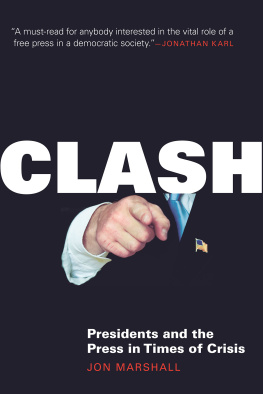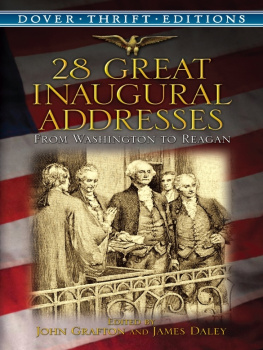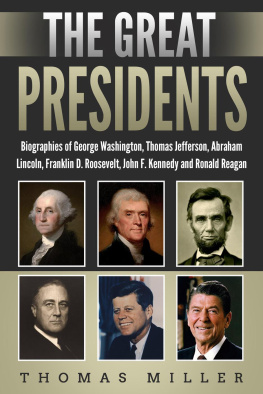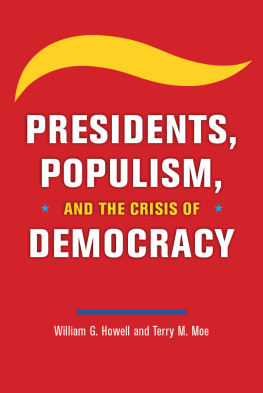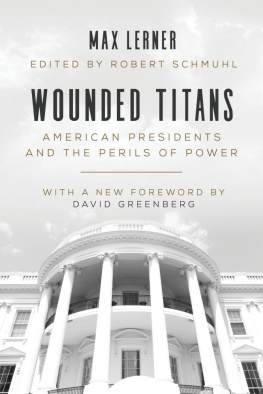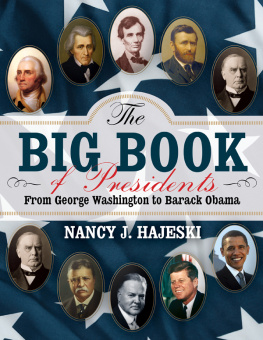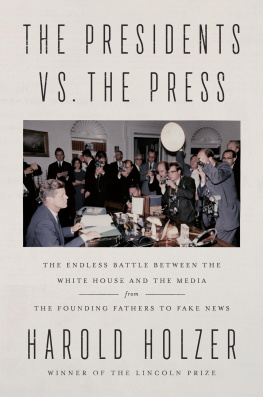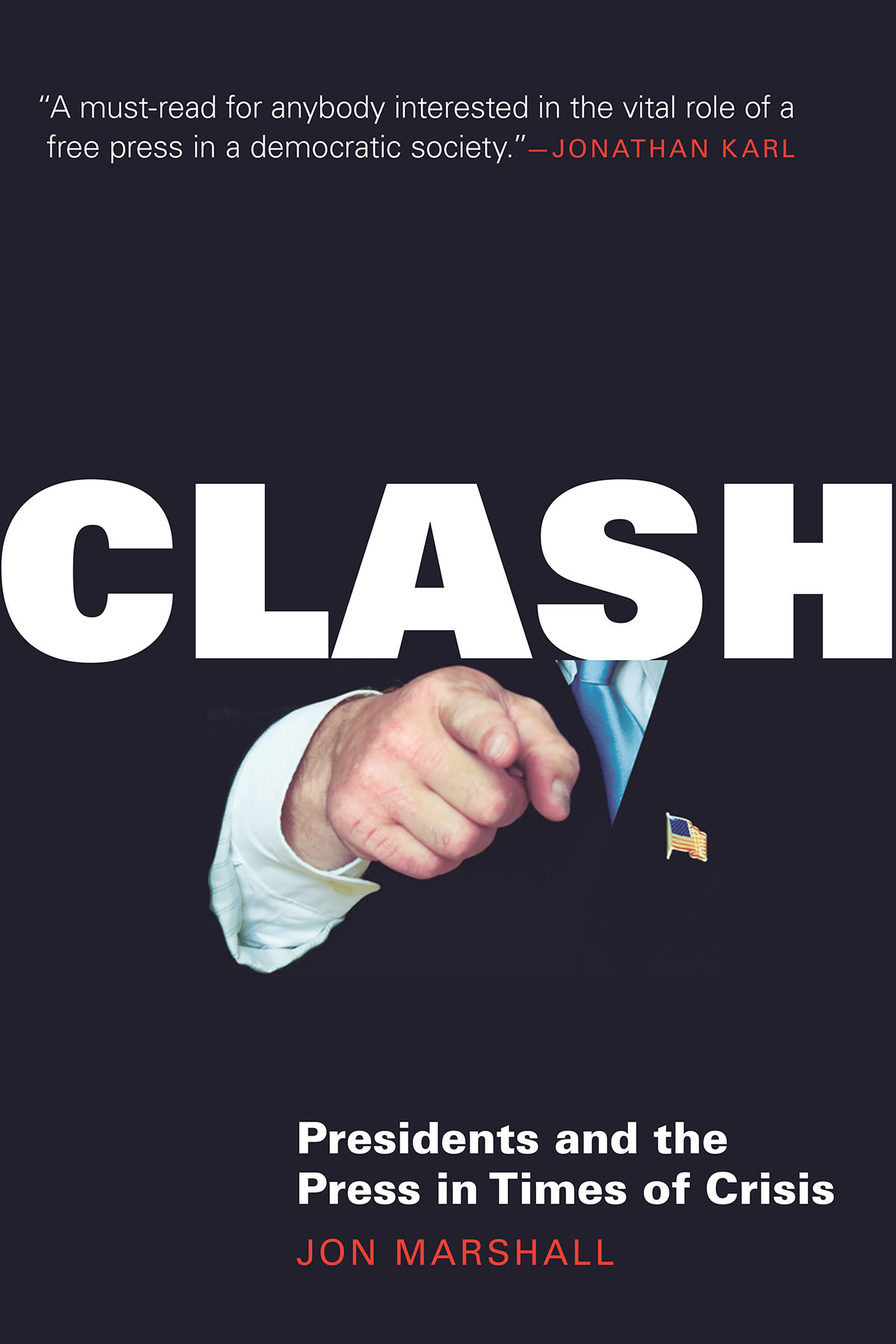
From Adams to Trump, from Lincoln to Obama, American presidents have had a symbiotic and adversarial relationship with the press. Jon Marshalls carefully researched book takes us inside the hard-nosed reporting, the confrontations, calculations, and prevarications, to paint a picture of the often troubled connection between two of the most powerful forces in our country, our commander in chief and the sprawling news media, in moments of high tension. The result is a clearer understanding of this highstakes, complex relationship that has consequences for every American.
Judy Woodruff, anchor and managing editor of PBS NewsHour
Jon Marshall offers a compelling tutorial on the often troubled relationship between American presidents and the reporters who cover them. Clash is a must-read for anybody interested in the vital role of a free press in a democratic society.
Jonathan Karl, chief Washington correspondent of ABC News and former president of the White House Correspondents Association
Donald Trump didnt start this war. In Clash Jon Marshall skillfully traces a fraught relationship from the republics earliest days. But his sobering message in this deeply reported book is that the financial strain and fragmentation of the news media and Trumps willingness to embrace and repeat lies have presented an unprecedented challenge to journalists and democracy.
Susan Page, Washington Bureau chief of USA Today and author of Madam Speaker: Nancy Pelosi and the Lessons of Power
Jon Marshall has produced a timely, well-researched exploration of how presidents from John Adams to Donald Trump have tried to suppress press scrutiny of their conduct in the White House. This is good reading for voters in assessing President Bidens relationship with the news media and the American public.
Leonard Downie Jr., former executive editor of the Washington Post and author of All About the Story: News, Power, Politics, and the Washington Post
With Clash Jon Marshall continues to establish himself as a leading scholar of the nexus of journalism and presidential history. His focus illuminates the perennial awkward dance involving presidents and reporters each trying to lead as the other manages the changing tempo of technology, politics, personal idiosyncrasies, and American mores. Marshall is emerging as a stalwart defender of the First Amendment and engaging storyteller of the clashes between the press and the presidency.
Tom Mascaro, author of Into the Fray: How NBC s Washington Documentary Unit Reinvented the News
Clash
Presidents and the Press in Times of Crisis
Jon Marshall
Potomac Books
An imprint of the University of Nebraska Press
2022 by Jon Marshall
Cover designed by University of Nebraska Press; cover image iStock / Jason_V.
Author photo Jenna Braunstein.
All rights reserved. Potomac Books is an imprint of the University of Nebraska Press.
Library of Congress Cataloging-in-Publication Data
Names: Marshall, Jon, 1963 author.
Title: Clash: presidents and the press in times of crisis / Jon Marshall.
Description: Lincoln: Potomac Books, an imprint of the University of Nebraska Press, 2022. | Includes bibliographical references and index.
Identifiers: LCCN 2021036669
ISBN 9781640123854 (hardback)
ISBN 9781640125261 (epub)
ISBN 9781640125278 (pdf)
Subjects: LCSH : PresidentsPress coverageUnited StatesHistory. | Press and politicsUnited StatesHistory. | Mass mediaPolitical aspectsUnited States. | BISAC : POLITICAL SCIENCE / American Government / General | SOCIAL SCIENCE / Media Studies
Classification: LCC JK 554 . M 37 2022 | DDC 973.09/9dc23
LC record available at https://lccn.loc.gov/2021036669
The publisher does not have any control over and does not assume any responsibility for author or third-party websites or their content.
To Laurie, Justin, Andrew, and Zachary,
who bring joy to every day
And to all of the journalists
who have been threatened, assaulted, imprisoned, or killed
for doing their jobs of informing us
If the press does not tell us, who will?
Ronald Reagan, 40th president of the United States, An American Life, 1990
Journalists are accused of being lapdogs when they dont ask the hard questions, but then accused of being rude when they do. Good thing we have tough hides.
Gwen Ifill, former PBS NewsHour anchorwoman, Rediscovering Black History, 2016
The true enemies of the peopleand democracyare those who try to suffocate truth by vilifying and demonizing the messenger. The response to that cannot be silence.
Des Moines Register, 2018
Contents
The President and the Peculiar Press Conference
The White House press corps had tough questions for President Donald Trump and his Coronavirus Task Force at their briefing on March 19, 2020. The virus was spreading rapidly through the United States with 4,777 confirmed cases. Hospitals were running out of ICU beds, and some governors were requiring schools and businesses to close to stop the diseases spread. Why was the United States not prepared with more testing and supplies? NBC Newss Kristen Welker asked the president.
Trump responded as he often did when faced with an uncomfortable question. He blamed the press. We were very prepared, the president said. The only thing we werent prepared for was the media. The media has not treated it fairly.
Trump then pointed at Chanel Rion of the upstart One America News Networkknown as both OAN and OANN to ask the next question. OAN was owned by Robert Herring, a San Diego multimillionaire who wore socks with Trumps image on them. Loyalty to Trump was Rions strong suit; accuracy wasnt. She had previously promoted false conspiracy theories that the coronavirus was created in a North Carolina laboratory, Democratic presidential candidate Joe Biden was senile, and former president Bill Clinton and First Lady Hillary Rodham Clinton were responsible for the death of a Democratic National Committee employee.
OAN , Trump said after pointing to Rion. They treat me very nicely.
Rion proved they did as she began one of the most bizarre exchanges in the history of presidents and the press. Do you consider the term Chinese food racist? she asked.
I dont think its racist at all, Trump replied.
On that note, Rion continued, major left-wing news media, even in this room, have teamed up with Chinese Communist Party narratives and theyre claiming you are racist for making these claims about the Chinese virus. Is it alarming that major media players, just to oppose you, are consistently siding with foreign state propaganda, Islamic radicals, and Latin gangs and cartels, and they work right here, at the White House, with direct access to you and your team?
Trump loved the question. It allowed him to rant about one of his favorite themes, his anger toward the press. He attacked the Wall Street Journal, a staunchly conservative newspaper owned by the same company that ran Fox News, one of his most aggressive promoters. Other reporters in the room looked startled, and members of the Coronavirus Task Force squirmed behind him. He also blasted the New York Times and Washington Post, two of the newspapers that had investigated him the most. Because, you see, I know the truth, Trump declared. And people out there in the world, they really dont know the truth.
As he often did, Trump accused the press of dishonesty. Rion eagerly agreed. But more than dishonest, theyre siding with state propaganda overseas, she said.
Next page
